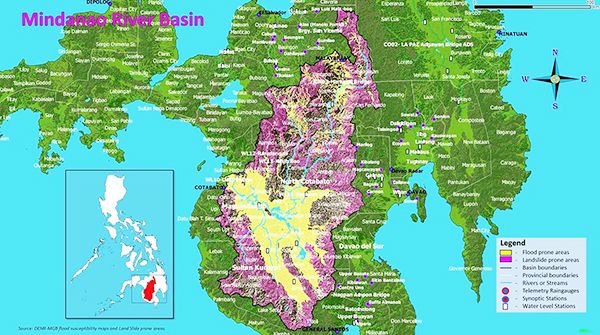MinDA eyes high-level talks on disaster preparedness in Central Mindanao
KIDAPAWAN CITY – The Mindanao Development Authority is planning to hold high-level discussions with local government officials in Central Mindanao to address the perennial flooding and beef up disaster preparations in the region.
Engr. Ian Dalisay, project manager of the Mindanao River Basin Management Council (MRBC) Secretariat, said that they have yet to finalize the dates for the meeting.

MINDANAO River Basin map
Dalisay added that the meeting with governors and other local government officials is part of an initial step to update the existing Mindanao River Basin Master Plan as well as discuss recommendations in resolving perennial flooding.
“What we need now is to strengthen the council through an executive order from the President with mandates and sustainable financing, more rationalized membership, and inclusion of multi-stakeholder participation,” Dalisay said.
MinDA was supposed to gather local government officials from Central Mindanao and several experts on August 6 in General Santos City but the event did not push through due to unforeseen circumstances.
Instead, a small group discussion went on without most of the top local government officials in Koronadal City on that day.
MindDA is one of the government agencies tasked to oversee the rehabilitation and management of MRB-affected areas, aligned with the Mindanao River Basin Integrated Management and Development Master Plan.
The other agencies are the Department of Environment and Natural Resources-River Basin Control Office (DENR-RBCO) and the National Disaster Risk Reduction and Management Council-Office of Civil Defense (NDRRMC-OCD).
Massive flooding last month, especially in the provinces of Cotabato and Maguindanao del Sur, affected at least 800,000 persons and devastated thousands of hectares of agricultural land.
The flooding was spawned by heavy rains in the region, causing the Pulangi River to overflow and inundated hundreds of barangays in low-lying areas.
Local government officials from affected municipalities and provinces have been appealing to the national government to resolve perennial flooding.
Cotabato Gov. Emmylou Taliño-Mendoza has urged the national government to assist local government units in addressing the problem by referring to the master plan.
Mendoza said that local governments cannot resolve perennial flooding due to limited resources.
Dalisay suggested that there should be an active participation among LGUs within the Mindanao River Basin which covers Cotabato City and provinces of Bukidnon, Cotabato, Maguidanao del Norte, Maguindanao del Sur, South Cotabato, and Sultan Kudarat.
He suggested that there should be a mechanism that would consider the governance framework of both the Bangsamoro Autonomous Region in Muslim Mindanao (BARMM) and the national government for the management and development of MRB that covers at least 21,000-square kilometers across five regions and is the second-largest river basin in the Philippines. The river system’s headwaters are located in Bukidnon.
In 2017, Mindanao River Basin Integrated Management and Development Master Plan was released as a blueprint for the sustainable development of the MRB.
The document includes not just the solutions in addressing the perennial flooding but also a roadmap towards a secure and resilient future for both the populace and the ecosystems within the basin.
Dalisay said that the master plan should be updated due to developments in the region.
Recently, representatives from different stakeholders coming from the different parts of MRB convened to develop an inter-LGU risk information platform and protocol in support of strengthened MRB governance.
Dalisay said that the flooding in Central Mindanao highlighted the need for improved disaster risk reduction and management (DRRM) coordination, especially across LGUs on the MRB.
Among the recommendations following the workshop is that regular capacity building on DRRM and climate change adaptation should be provided to LGUs and communities, he said.
“The workshop represents a significant step towards improved DRRM coordination and climate change adaptation in the Mindanao River Basin,” he added.